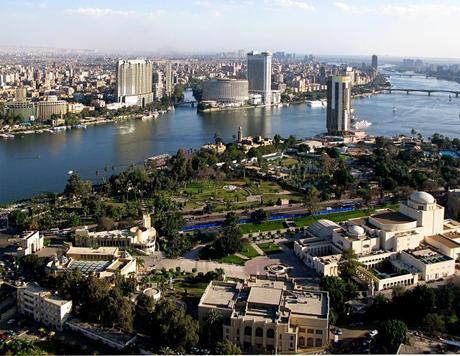
via Wikimedia Commons
This blog originally appeared in Arabic on CIPE-Arabia.org.
Egypt is currently undergoing a critical moment due to its failure to adequately deal with over 40 years of accumulated economic problems. And yet, according to various reports, including the CitiBank report in 2010, Egypt has the potential to be one of the biggest economies in the world.
The Egyptian economy’s state is challenging because we have few alternatives other than the current economic reforms but if they are implemented poorly, they will negatively impact everyone; the rich, poor, and middle class. However, if these reforms are implemented well, they could deliver for all Egyptian citizens in both the medium and long term.
Therefore, the key question is: is there any better alternative than working on the agreement with the IMF? The answer is, “no.”
We are currently facing various challenges which, if remain unaddressed, will hinder any prospects for a better future. We have to understand these challenges and discuss them openly so we can work together in addressing them. Having not yet felt the true extent of our current economic crisis, Egyptian citizens are not aware of the consequences of leaving this issue unaddressed. In reality, the current foreign reserves (deposits given by foreign countries to assist Egypt’s economy) are at a negative figure. Additionally, we are unable to separate the political and economic spheres. The effect of the two political ‘earthquakes’ experienced by Egypt in 2011 and 2013 are negatively reflected in the current economic and security situation. Moreover, these “earthquakes” led to the fragmentation of Egypt’s political and economic institutions. Thankfully, there are still some consolidated institutions that have prevented the state from collapsing.
However, corruption remains one of the strongest and persistent institutions in opposing any corrective reforms, particularly in regards to such issues as commodity subsidies. Thousands of state employees and beneficiaries of corruption manipulate and abuse the dysfunctional system to obstruct any attempts to reform.
In addition to these aforementioned challenges, there are many others:
- The prevalence of the informal sector not only results in lost tax revenue but also leaves significant financial assets outside of the banking system and economic growth potential. As a result, the sizable informal economy does not contribute to the economic growth of the country or to government revenues. Furthermore, informal businesses do not benefit from government incentives, including subsidies on exports, training and industry modernization programs, as well as the previous central bank initiative to finance SMEs with 200 Billion EGP at 5% interest rate;
- The prevalence of monopolies in various industrial and commercial sectors and the challenges of monitoring the quality of services in such a disorganized trading context;
- The bureaucratic obstacles encountered upon entering the market when applying for registration and a license, as well as a list of required procedures that can take up to three years to fulfill. Additionally, it is particularly difficult (almost impossible) to exit the market;
- The creation of parallel institutions instead of structural reforms. For example, the government has previously facilitated procedures to expedite the reform process in some of the industrial and free zones. This has created a parallel system which might be a good solution in the short term, but needs to be followed by actual long-term, structural reforms that benefit the majority of businesses in Egypt. I believe Egypt is capable of such structural reform;
- Leaving 95% of the country’s land under-utilized instead of allocating it to sectors like agriculture, industry, energy, tourism, and trade. This is largely due to populist policies implemented as a result of a bad experience with feudalism before 1956. However, the land provides a great opportunity for Egypt to develop;
- The irrational consumption of energy, water, and other commodities and services due to their artificially low prices;
- Inefficient fiscal policy (there are currently four different prices for currency) threatens foreign investors’ willingness to risk investing in Egypt. There is no way to proceed with economic reforms without reforming the fiscal policy;
- And the prevalence of the cash economy in all sectors and levels of the Egyptian market.
Despite the current economic deterioration and the cited challenges above, we cannot deny that there have been some successful government initiatives in the past three years, such as subsidy reform and national projects in infrastructure, roads, electricity, and gas exploration. But these reforms are not designed within a comprehensive program directed towards a common goal. Without a comprehensive reform agenda, the fragmented reforms cannot lead to actual change. The government should adopt comprehensive reform that includes all stakeholders, reforms legislation, and provides incentives. There are many tools that the government can implement, such as monetary and fiscal policies, financing, monitoring, anti-monopoly policies, incentives, investment promotion, and law enforcement. However, the government should not engage in the manufacturing, and business and markets process. Economic reform is multifaceted and requires cooperation between the government, the private sector, and civil society.

Blog author, Tarik Tawfik
I am optimistic about the new agreement with the IMF because we finally have a comprehensive economic reform program rather than just fragmented initiatives. One condition of the IMF agreement is that the institutional reform process be developed and initiated by the government as well as its monitoring after receiving the loan. Now we can say we have a plan to tackle the above challenges and support foreign direct investment.
In this regard, there are some important points to be considered if we want to benefit from the new deal. Of course reforming the fiscal policy is the most significant but there are others, such as:
- Addressing the demands of small- and medium-sized enterprises (SMEs) given their core contribution to the Egyptian economy. Reforms should not be limited to the demands of big businesses only. Large firms are a minority if we compare them to SMEs, which represent 95% of the enterprises in Egypt. In addition, we should work not only on attracting large foreign enterprises to invest in Egypt but also to attract medium-sized firms;
- Developing domestic trade is a high priority because it encompasses a large part of production and trade chain in the market. Modernizing domestic trade helps in better regulating the market;
- Protecting competition and guarding against monopolies is essential to diversifying the economy in Egypt. This will not happen without facilitating entrance to the market by easing bureaucratic complexities;
- Facilitating entry and exit from the market is the key to integrating the informal sector;
- Implementing the current package of legislation approved by government but still pending parliamentary approval, such as the industrial development law, the import and export law, the industrial licensing law, and the sole proprietorship companies’ law, as well as further expediting the passage of the investment and bankruptcy laws. It is also worth noting that the development of industry does not only require developing industrial policy, but also trade and export reform;
- Pushing for a more stable economic climate to ensure a functioning supply and demand system while not controlling or fixing prices. We cannot fall into the trap of controlled trade because a free enterprise system is necessary for economic growth and development. Prices can be monitored by civil society and consumer protection associations like in more developed countries;
- Improving management of Egyptian labor. While there is no problem with the Egyptian labor force (the Egyptian worker is skilled), there is a problem with labor management. As long as there is a good management system and a framework of rights and duties, workers will comply with the institutions, which will reflect positively on a worker’s’ production;
- Limiting cash transactions in the market in order to understand the actual size of the Egyptian market and to combat tax evasion, corruption, and financing terrorism;
- Supporting and empowering policymakers to revise provisions regulating public funds. A decision maker might be hesitant to make timely decisions with public expenditures, particularly if he is subject to criminal law and wants to avoid charges of corruption;
- Implementing sound structural reforms instead of establishing parallel institutions and only implementing minor, small-scale changes;
- Targeting subsidy reform in order to reach target groups. The government should subsidize individuals and not commodities. The government has begun developing this reform and should proceed with it;
- Privatizing, or at least separating state ownership from state-owned firms’ management, is essential. In some countries, such as China, privatization is seen as a developmental tool;
- And finally, proceeding with the steps listed in the IMF agreement. While the agreement might appear at times as aggressive, we must proceed with it because the alternative is the status quo, which will deteriorate day after day until we reach absolute chaos.
Tarek Tawfik is Deputy Chairman of the Federation of Egyptian Industries, Chairman of Cairo Poultry Group, and former Chairman of the Chamber of Food Industries.

